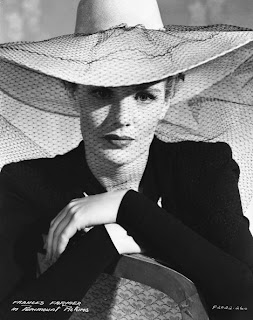
Decades before entertainers like Madonna and Lady Gaga became poster girls for outrageous behavior and bizarre fashion choices, high school senior and later actress Frances Farmer had earned national notoriety and the nickname “The Bad Girl of West Seattle High” for her writing. And apparently, she wasn’t terribly fond of wearing hats, either.
Frances Farmer was a 17 year-old senior at West Seattle High when her English teacher submitted her essay God Dies to a national contest sponsored by The Scholastic. Though the title was controversial, the writing impressed the judges and the essay was published in the May 1932 issue of the magazine. She wrote:
“After slamming through the house, panicky and breathless from searching, I could stop in the middle of a room and shut my eyes. ‘Please God, let me find my red hat with the blue trimmings.’ It usually worked. God became a super-father that couldn’t spank me. But if I wanted a thing badly enough, he arranged it. That satisfied me until I began to figure that if God loved all his children equally, why did he bother about my red hat and let other people lose their fathers and mothers for always?”
The essay’s title inspired angry letters and town hall meetings, and newspapers around the country published headlines such as Seattle Girl Denies God and Wins Prize.
 But Farmer didn’t stop there. In 1935, as a drama student at the University of Washington, Farmer won a trip to the Soviet Union (much to the outrage of her mother) sponsored by the left leaning newspaper, The Voice of Action. Farmer later reported that the trip was a means to an end: on her way back from Russia, when landing in New York, she exchanged her ticket back to Seattle for a rented room in the city. She landed an agent and a contract with Paramount Pictures not long after, which set the stage for her film career in Hollywood’s Golden Age.
But Farmer didn’t stop there. In 1935, as a drama student at the University of Washington, Farmer won a trip to the Soviet Union (much to the outrage of her mother) sponsored by the left leaning newspaper, The Voice of Action. Farmer later reported that the trip was a means to an end: on her way back from Russia, when landing in New York, she exchanged her ticket back to Seattle for a rented room in the city. She landed an agent and a contract with Paramount Pictures not long after, which set the stage for her film career in Hollywood’s Golden Age.
But trouble had no trouble finding the newly signed actress. Shortly after joining Paramount she was called into a serious meeting with the studio’s talent coach to discuss her “unglamorous” behavior. In addition to not wearing a hat on the street, her shoes and raincoat were also less than fashionable. “The movie fans expect more of their favorites,” she was told. Her response to the management was sharp: “I’ve never seen anybody from the head office so I wouldn’t know how to get in, but will you go up there and give them a message from me? Will you tell them that if they paid as much attention to the parts they give their actresses as they do to their clothes, we’d probably both make a lot more money?”
Frances Farmer was best known for films such as Rhythm on the Range (1936) and Come and Get It (1936) and numerous theater productions. Her later career was troubled with arrests and institutionalization for mental illness, but since her death in 1970 of cancer, she has inspired books, songs (including Kurt Cobain’s Frances Farmer Will Have Her Revenge on Seattle), a loyal following of fans and even a Facebook Page.
Our archives tell more than the story of The Scholastic Art & Writing Awards – as we continue to sift through our past records, we’re rediscovering a unique part of American history, one slide, photograph, manuscript and letter at a time. You can follow our archival treasure hunt with our new series, The Archive Pick of the Month.
